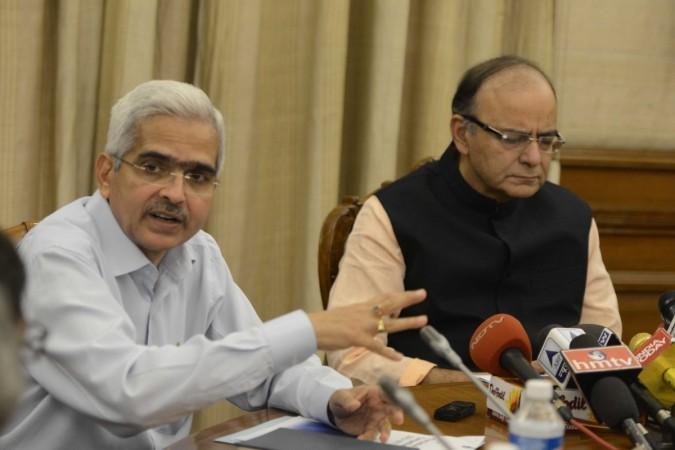
Economic Affairs Secretary Shaktikanta Das on Thursday said that the existing limit of Rs 4,500 that citizens can exchange from bank counters has been reduced to Rs 2,000. It will be effective from November 18.
Das said the government took the decision to enable a larger number of people to reach the bank counters and avail the new currency notes and those of smaller denominations. The exchange should be from the person's own bank account and is permitted "just once per person" or one account against one person in a day.
Das strictly referred to "over the counter exchange of old notes" and not "withdrawal from bank accounts." He also made it clear that this decision was taken only to allow a larger number of people to reach the counters and not because there is shortage of new currency notes.
Das strictly referred to "over the counter exchange of old notes" and not "withdrawal from bank accounts." He also made it clear that this decision was taken only to allow a larger number of people to reach the counters and not because there is shortage of new currency notes.
The DEA secretary also spoke about how farmers and the rural sector are one of the most "important components of the economy." Therefore, the government has decided to allow farmers to withdraw up to Rs 25,000 per week against the crop loans sanctioned and credited to their accounts subject to the set limits depending upon the different kinds of crops that the farmers grow. This rule also applies to the kisan credit cards.
"These accounts have to be in the name of the concerned farmer and have to be KYC compliant and this will be subject to loan limits," Das said.
Farmers, who sell their produce in the agricultural produce market committee (APMC) or the agricultural mandis to be purchased by traders, receive payments in their accounts either through cheque deposits or money credited through RTGS method. Das said that such farmers can withdraw up to Rs 25,000 per week from their accounts. He repeated that these accounts have to be KYC compliant and in the name of the respective farmers.
According to Das, this will enable the farmers to carry on with their "normal agricultural activities" and meet their daily requirements.
The third decision taken by the government was to allow registered traders with the APMC markets to withdraw up to Rs 50,000 per week to enable them to meet their requirements of sundry cash and dispatch daily wages to workers. These accounts also have to be KYC compliant.
Fourthly, Das said that the time limit for the payment of the crop insurance premium has been extended by 15 days to help the farmers pay the premium without any hassle. States set various limits for the payment of the premium depending on the local agricultural and farming methods.
The fifth decision taken by the government was to allow families to withdraw up to Rs 2.5 lakh for weddings from KYC compliant bank accounts. The amount can be withdrawn from one account — father, mother or those who are getting married — per family. In simple terms, only one member per family can withdraw this amount from their own bank account. Multiple withdrawals within the same family are not permitted. A self-declaration saying that the money has been withdrawn from a single account will also be obtained to monitor this.
"We hope that people adhere to this norm. The government expects that the people will abide by this rule," Das added.
The government has also decided to allow central government employees "up to Group C" — which includes equivalent levels in defence, paramilitary forces, railways and central public centre enterprises —to withdraw up to Rs 10,000 of their salary advance in cash that will further be adjusted with their November wages.
Das further made it clear that cash is being transported by the concerned authorities according to the action plan. If any bank or ATM reports shortage of money, the government makes sure that cash is immediately dispatched to them.














